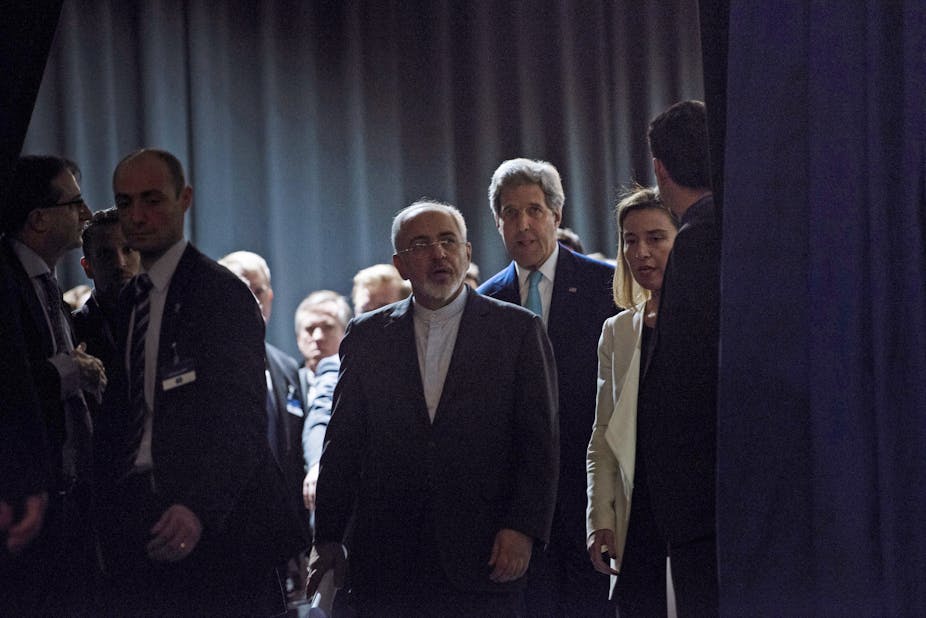The announcement that an agreement has been reached by the P5+1 (the five permanent members of the Security Council and Germany) and Iran has been met with equal degrees of enthusiasm, surprise and incredulity.
Reasons to be cheerful
Optimists can point to the significance of a “historic” political agreement. “Getting to yes” has been achieved, despite hostile opposition from Iran’s regional adversaries, notably Israel and Saudi Arabia. And, the optimists can add, this agreement’s purported and unexpected level of detail gives succor to the idea that the final, technical agreement can satisfy the concerns of even the most belligerent opponents.
As President Obama said in his announcement, the verification requirements are unprecedented. Yet, in a nod to Iran’s critics, the president also noted that while sanctions relating to the development of a nuclear weapon will be eased, those regarding human rights and terrorism will remain in effect.
If the momentum generated in Lausanne can be maintained, a final agreement scheduled at the end of June may even convince the US Congress to support the deal and thus reduce sanctions.
Pessimists, in contrast, remain skeptical. For them, there are three issues.
Reasons to be skeptical
The first relates to the West’s capacity to enforce such agreements. The historical precedent is clear: North Korea made a similar promise to abandon its nuclear program only to renege on the deal. Verification is easier said than done.
Ronald Reagan’s notion of “trust but verify” may make for a good sound bite. But ensuring that the Iranians keep to their end of the bargain is a lot harder than President Obama suggested.
Second, many will also worry that a healthier, wealthier and more self-confident Iran –- freed of sanctions – will be better resourced to engage in conflicts across the Middle East.
Iran is now either directly involved or supporting proxies from Lebanon to Syria and Iraq to Yemen. The easing of sanctions will potentially allow them to pursue their strategy as a regional challenger to both Israel and Saudi Arabia.
Third, some major regional allies worry that this deal is a bridgehead to the formation of a broader rapprochement between Washington and Teheran at their expense.
Most of the latter stages of the negotiations were more bilateral – between the US and Iran – than multilateral. We’ve no idea what side deals – if any – were agreed, and where that leaves America’s traditional regional partners.
Certainly, recent events have strained this administration’s relations with both Israel and Saudi Arabia. Whether normal relations will be restored when President Obama leaves office depends in part on who replaces him and how the Iranians behave in the meantime.
So what, on balance, are we to conclude at this stage?
Three takeaways
First, despite the huffing, puffing and grand pronouncements, this is far from a done deal.
Depending on your perspective, either the Devil or the Lord is in the details. A lot has to be negotiated between now and the June 30th deadline for a final agreement. And there are a lot of people who can still sabotage the process.
As the adage goes, when it comes to the Middle East, they never “miss an opportunity to miss an opportunity.” And if all else fails, there is always the ultimate saboteur – the US Congress. The President’s trumpeting will be met with a wary eye on Capitol Hill. We’ve got through the first stage and first stages do not make for historic agreements.
Second, the agreement process may make for great theater but it also may be thoroughly irrelevant.
I contacted a highly distinguished expert on proliferation for their views on the utility of the deal. On condition of confidentiality, this person responded that,
“No agreement can stop the Iranians from getting a nuclear weapon if they have the political will to do it. And no military intervention that can be justified to the international community will be sufficient to degrade their nuclear facilities.”
If that’s true, the lesson is that the Iranians can develop a bomb, regardless of the terms of the agreement or the level of sanctions. It is a case of when, not if.
And if that is true, I would not expect the Israelis or Saudis to sit idly by at the President’s behest. The Israelis can reasonably be expected to respond with preemptive measures if they think the Iranians are cheating. The Saudis are probably on the phone to Pakistan already ordering their own bomb, just in case.
Finally, President Obama’s big bet is that the forces of reform will take hold in Iran – that educated middle class Iranians will take power from the mullahs and embrace a peaceful coexistence with the West.
It’s a big bet. Because the alternative is that an emboldened Iran will strengthen the hand of the mullahs and Iran will become more theocratic and adversarial, not less so.
What’s the lesson? Even really good days in the Middle East are often bad ones, depending on your optics.

